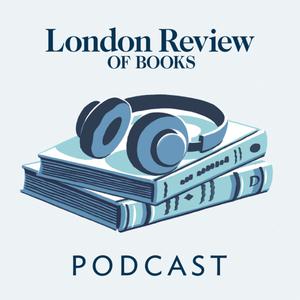
New Books in Environmental Studies
Interviews with Environmental Scientists about their New Books
- 49 minutes 35 secondsAt Every Depth: Our Growing Knowledge of the Changing Oceans
Today’s book is: At Every Depth: Our Growing Knowledge of the Changing Oceans (Columbia UP, 2024), by Tessa Hill and Eric Simons, which takes readers beneath the waves and along the coasts, to explore how climate change and environmental degradation have spurred the most radical transformations in human history. The world’s oceans are changing at a drastic pace. In response, the people who know the ocean most intimately are taking action for the sake of our shared future. Community scientists track species in California tidepools. Researchers dive into the waters around Sydney to replant kelp forests. Scientists and First Nations communities collaborate to restore clam gardens in the Pacific Northwest. In At Every Depth, the oceanographer Dr. Tessa Hill and the science journalist Eric Simons profile these and other efforts to understand and protect marine environments, taking readers to habitats from shallow tidepools to the deep sea. By sharing the stories of scientists, coastal community members, Indigenous people, shellfish farmers, and fisheries workers, At Every Depth brings together varied viewpoints, showing how scientists’ research and local and Indigenous knowledge can all complement each other to inform a more sustainable future.
Our guest is: Dr. Tessa Hill, who is a professor in the Earth and Planetary Sciences Department at the University of California, Davis. She teaches and researches oceanography and climate change. She is a recipient of the Presidential Early Career Award for Scientists and Engineers and a fellow of the American Association for the Advancement of Science, and she was awarded the Rachel Carson Lecture by the American Geophysical Union.
Our host is: Dr. Christina Gessler, the producer of the Academic Life podcast. She holds a PhD in history, which she uses to explore what stories we tell and what happens to those we never tell.
Listeners may also enjoy these episodes with women in science:
- Climate Change Explained
- Women in Shark Sciences
- This conversation with Dr. Ware about dragonflies
- The surprising world of wasps
- When Dr. Martin was considering whether to stay or drop out
Welcome to Academic Life, the podcast for your academic journey—and beyond! Join us again to learn from more experts inside and outside the academy, and around the world.
Learn more about your ad choices. Visit megaphone.fm/adchoices
Support our show by becoming a premium member! https://newbooksnetwork.supportingcast.fm/environmental-studies
16 May 2024, 8:00 am - 34 minutes 25 seconds"Orion" Magazine: A Discussion with Sumanth Prabhaker
Sumanth Prabhaker is the editor-in-chief of Orion and the founding editor of Madra Press. He earned an MFA in creative writing at the University of North Carolina Wilmington, where he was an editor for the journal Ecotone.
Founded in 1982, Orion has evolved as a magazine over the years from the quieter, reverential environmental sensitivity that continues to distinguish it into also a wider awareness of global injustices that especially impact the Global South. In this episode, three essays were discussed that under his leadership, Sumanth Prabhaker nurtured into existence over a span that sometimes stretched into years. First among them is “How the Lark Got Her Crest” by Marianne Jay Erhardt from the Summer 2023 issue. It works from the slightest of bases, the few lines of Aesop’s fable about a lark, into a rather profound piece about how one might bury one’s father “in your head’ like the lark does. Language and honoring one’s parent becomes the grounding in this case. Second up, “The Other Bibles” by Katrina Vanderberg from the Spring 2024 issue began as almost a lark: why not include a book review of The Bible in a special issue devoted to religious rituals? The essay is at once a memorial to a husband who died of AIDS as a result of poorly monitored blood transfusions meant to help treat his hemophilia, as well as exploring the spiritual ecology of texts that come to us via illustrations in Bibles or the handiwork of the Earth itself. Third, the episode concludes by discussing “Natural Selection” by Erica Berry from the Winter 2023 issue. A Tinder ad about dating practices led into a piece on romance and even four Romance novels also written during the Year Without a Summer in 1916 when a volcanic eruption in Indonesia caused famine and disease and led, among other output, to Mary Wollstonecraft Godwin and her husband Percy Bysshe Shelley setting to work on Frankenstein.
Dan Hill, PhD, is the author of ten books and leads Sensory Logic, Inc.
Learn more about your ad choices. Visit megaphone.fm/adchoices
Support our show by becoming a premium member! https://newbooksnetwork.supportingcast.fm/environmental-studies
15 May 2024, 8:00 am - 51 minutes 46 secondsBan Wang, "At Home in Nature: Technology, Labor, and Critical Ecology in Modern China" (Duke UP, 2022)
In his latest book At Home in Nature: Technology, Labor, and Critical Ecology in Modern China (Duke UP, 2022), Ban Wang uses an ecocritical lens to examine anthropocentrism, technoscientific hubris, and ecologically destructive modes of production in modern China. Analyzing modern discourse, literature, film, and science fiction, Wang asserts that the domination of nature and labor under capitalism and technocrats is the culprit of ecological crises and human alienation. Alternatively, Wang argues, utopianisms of nonalienated labor keep alive the ideals of resonance between humans and Earth.
Ban Wang is the William Haas Endowed Chair Professor in Chinese Studies in the Department of East Asian Languages and Cultures and Comparative Literature at Stanford University. His major publications include China in the World: Culture, Politics, and World Vision (Duke UP, 2022), Illuminations from the Past: Trauma, Memory, and History in Modern China (Stanford UP, 2004), History and Memory: A Critique of Global Modernity (Oxford UP, 2004), Narrative Perspective and Irony in Chinese and American Fiction (Edwin Mellen, 2002), and The Sublime Figure of History: Aesthetics and Politics in Twentieth-Century (Stanford UP, 1997).
Ailin Zhou is a PhD student in Film & Digital Media at University of California, Santa Cruz. Her research interests include transnational Chinese cinema, Asian diasporic visual culture, contemporary art, and feminist and queer theories.
Learn more about your ad choices. Visit megaphone.fm/adchoices
Support our show by becoming a premium member! https://newbooksnetwork.supportingcast.fm/environmental-studies
15 May 2024, 8:00 am - 1 hour 1 minuteLiliana Doganova, "Discounting the Future: The Ascendancy of a Political Technology" (Princeton UP, 2024)
Forest fires, droughts, and rising sea levels beg a nagging question: have we lost our capacity to act on the future? Dr. Liliana Doganova’s book Discounting the Future: The Ascendancy of a Political Technology (Princeton University Press, 2024) sheds new light on this anxious query. It argues that our relationship to the future has been trapped in the gears of a device called discounting. While its incidence remains little known, discounting has long been entrenched in market and policy practices, shaping the ways firms and governments look to the future and make decisions accordingly. Thus, a sociological account of discounting formulas has become urgent.
Discounting means valuing things through the flows of costs and benefits that they are likely to generate in the future, with these future flows being literally dis-counted as they are translated in the present. How have we come to think of the future, and of valuation, in such terms? Building on original empirical research in the historical sociology of discounting, Dr. Doganova takes us to some of the sites and moments in which discounting took shape and gained momentum: valuation of European forests in the eighteenth and nineteenth centuries; economic theories devised in the early 1900s; debates over business strategies in the postwar era; investor-state disputes over the nationalisation of natural resources; and drug development in the biopharmaceutical industry today. Weaving these threads together, the book pleads for an understanding of discounting as a political technology, and of the future as a contested domain.
This interview was conducted by Dr. Miranda Melcher whose new book focuses on post-conflict military integration, understanding treaty negotiation and implementation in civil war contexts, with qualitative analysis of the Angolan and Mozambican civil wars.
Learn more about your ad choices. Visit megaphone.fm/adchoices
Support our show by becoming a premium member! https://newbooksnetwork.supportingcast.fm/environmental-studies
14 May 2024, 8:00 am - 20 minutes 53 secondsInhuman
In this episode of High Theory, Rasheed Tazudeen tells us about the inhuman. The inhuman offers a way of moving beyond the legacies of humanism and across categories and scales of being. Thinking with the inhuman world, from spools of thread to microplastics, helps us try and think otherwise about the complex assemblages that shape our lives.
If you want to learn more, check out Rasheed’s new book, Modernism’s Inhuman Worlds (Cornell UP, 2024). The book explores the centrality of ecological precarity, species indeterminacy, planetary change, and the specter of extinction to modernist and contemporary metamodernist literatures. Modernist ecologies emerge in response to the enigma of how to imagine inhuman being—including soils, forests, oceans, and the earth itself—through languages and epistemologies that have only ever been humanist. Rasheed asks how (meta)modernist aesthetics might help us to imagine (with) inhuman worlds, including the worlds still to be made on the other side of mass extinction.
Rasheed Tazudeen is a lecturer in English at Yale University. His work is focused broadly on the intersections between ecology, race, and sound in 19th- and 20th-century literature and music. He is currently at work on a second project tentatively titled The Musicked Earth: Towards a Decolonial Sound Ecology, focused on the resonances between Black/Afro-Caribbean and Indigenous theories of sound, music, festival, and ecology through the work of Sylvia Wynter, Édouard Glissant, Leanne Simpson, and Alice Coltrane.
This week’s image was made by Saronik Bosu in 2024. It represents a humanoid creature in fetal position, merging with the inhuman world.
Learn more about your ad choices. Visit megaphone.fm/adchoices
Support our show by becoming a premium member! https://newbooksnetwork.supportingcast.fm/environmental-studies
14 May 2024, 8:00 am - 23 minutes 41 secondsPer Högselius and Achim Klüppelberg, "The Soviet Nuclear Archipelago: A Historical Geography of Atomic-Powered Communism" (CEU Press, 2023)
In this episode of the CEU Press Podcast, host Andrea Talabér (CEU Press/CEU Review of Books) sat down with Per Högselius and Achim Klüppelberg to discuss their new book with CEU Press entitled, The Soviet Nuclear Archipelago: A Historical Geography of Atomic-Powered Communism (CEU Press, 2023).
The book is available Open Access, click here to download.
The war in Ukraine, with the exposure of nuclear power stations and the danger of atomic warfare, has made the legacy of the Soviet nuclear sector of critical importance.
The two authors map the Soviet nuclear industry in a shifting historical context, making sense of a complex socio-technical and environmental history. Taking an innovative approach, this book explores the history of atomic power in the former Soviet Union using the spatial dimensions of the nuclear industry as a point of departure.
Per and Achim’s book is part of our new series, CEU Press Perspectives. The series offers the latest viewpoints on both new and perennial issues, these books address a wide range of topics of critical importance today. The new series, originating from an international collection of leading authors, encourages us to look at issues from a different viewpoint, to think outside the box, and to stimulate debate.
You can learn more about the series here.
The CEU Press Podcast delves into various aspects of the publishing process: from crafting a book proposal, finding a publisher, responding to peer review feedback on the manuscript, to the subsequent distribution, promotion and marketing of academic books. We will also talk to series editors and authors, who will share their experiences of getting published and talk about their series or books.
Interested in CEU Press’s publications? Click here to find out more here.
Stay tuned for future episodes and subscribe to our podcast to be the first to be notified.
Learn more about your ad choices. Visit megaphone.fm/adchoices
Support our show by becoming a premium member! https://newbooksnetwork.supportingcast.fm/environmental-studies
12 May 2024, 8:00 am - 59 minutes 54 secondsDan Chapman, "A Road Running Southward: Following John Muir's Journey Through an Endangered Land" (Island Press, 2022)
In 1867, John Muir set out on foot to explore the botanical wonders of the South, keeping a detailed journal of his adventures as he traipsed from Kentucky southward to Florida. One hundred and fifty years later, on a similar whim, veteran Atlanta reporter Dan Chapman, distressed by sprawl-driven environmental ills in a region he loves, recreated Muir’s journey to see for himself how nature has fared since Muir’s time. Channeling Muir, he uses humor, keen observation, and a deep love of place to celebrate the South’s natural riches. But he laments that a treasured way of life for generations of Southerners is endangered as long-simmering struggles intensify over misused and dwindling resources. Chapman seeks to discover how Southerners might balance surging population growth with protecting the natural beauty Muir found so special.
Each chapter touches upon a local ecological problem—at-risk species in Mammoth Cave, coal ash in Kingston, Tennessee, climate change in the Nantahala National Forest, water wars in Georgia, aquifer depletion in Florida—that resonates across the South. Chapman delves into the region’s natural history, moving between John Muir’s vivid descriptions of a lush botanical paradise and the myriad environmental problems facing the South today. Along the way he talks to locals with deep ties to the land—scientists, hunters, politicians, and even a Muir impersonator—who describe the changes they’ve witnessed and what it will take to accommodate a fast-growing population without destroying the natural beauty and a cherished connection to nature.
A Road Running Southward: Following John Muir's Journey Through an Endangered Land (Island Press, 2022) is part travelogue, part environmental cri de coeur, and paints a picture of a South under siege. It is a passionate appeal, a call to action to save one of the loveliest and most biodiverse regions of the world by understanding what we have to lose if we do nothing.
Matt Simmons is an Assistant Professor of History at Emmanuel University where he teaches courses in U.S. and public history. His research interests focus on the intersection of labor and race in the twentieth-century American South. Connect with him at Matthew Simmons | LinkedIn.
Learn more about your ad choices. Visit megaphone.fm/adchoices
Support our show by becoming a premium member! https://newbooksnetwork.supportingcast.fm/environmental-studies
11 May 2024, 8:00 am - 1 hour 14 minutesMC Forelle on Cars, Chipification, and Repair
Peoples & Things host, Lee Vinsel, talks with MC Forelle, Assistant Professor of Engineering & Society at the School of Engineering and Applied Science at University of Virginia, about their research on the “chipification” of automobiles. MC’s work examines how computerization affects repair and a wide variety of other automotive experiences. In recent years, they have continued broadening out to include electric and autonomous vehicles and the environmental impacts thereof. Lee and MC also chew the fat about a bunch of other issues along the way.
Learn more about your ad choices. Visit megaphone.fm/adchoices
Support our show by becoming a premium member! https://newbooksnetwork.supportingcast.fm/environmental-studies
6 May 2024, 8:00 am - 1 hour 6 minutesSalar Mameni, "Terracene: A Crude Aesthetics" (Duke UP, 2023)
In Terracene: A Crude Aesthetics (Duke UP, 2023), Salar Mameni historicizes the popularization of the scientific notion of the Anthropocene alongside the emergence of the global war on terror. Mameni theorizes the Terracene as an epoch marked by a convergence of racialized militarism and environmental destruction. Both the Anthropocene and the war on terror centered the antagonist figures of the Anthropos and the terrorist as responsible for epochal changes in the new geological and geopolitical world orders. In response, Mameni shows how the Terracene requires radically new engagements with terra (the earth), whose intelligence resides in matters such as oil and phenomena like earthquakes and fires. Drawing on the work of artists whose practices interrogate histories of settler-colonial and imperial interests in land and resources in Iran, Iraq, Yemen, Kuwait, Syria, Palestine, and other regions most affected by the war on terror, Mameni offers speculative paths into the aesthetics of the Terracene.
Salar Mameni is an art historian specializing in contemporary transnational art and visual culture in the Arab/Muslim world with an interdisciplinary research on racial discourse, transnational gender politics, militarism, oil cultures and extractive economies in West Asia. Mameni has published articles in Signs, Women & Performance, Al-Raida Journal, Fuse Magazine, Fillip Review and Canadian Art Journal, and has written for exhibition catalogues in Dubai, Sharjah and Istanbul. Mameni was the curator of “Snail Fever,” at the Third Line Gallery in Dubai that explored art as a pandemic bringing together artists from the region whose works consider the embodied, viral and contaminating nature of sonic and visual aesthetics.
Najwa Mayer is an interdisciplinary cultural scholar of race, gender, sexuality, and Islam in/and the United States, working at the intersections of politics, aesthetics, and critical theory. She is currently a Society of Fellows Postdoctoral Scholar at Boston University.
Learn more about your ad choices. Visit megaphone.fm/adchoices
Support our show by becoming a premium member! https://newbooksnetwork.supportingcast.fm/environmental-studies
5 May 2024, 8:00 am - 47 minutes 47 secondsJohn J. Berger, "Solving the Climate Crisis: Frontline Reports from the Race to Save the Earth" (Seven Stories Press, 2023)
Solving the Climate Crisis: Frontline Reports from the Race to Save the Earth (Seven Stories Press, 2023) is a hopeful and critical resource that makes a convincing and detailed case that there is a path forward to save our environment. Illustrating the power of committed individuals and the necessity for collaborative government and private-sector climate action, the book focuses on three essential areas:
- The technological dimension move to 100% clean renewable energy as fast as we possibly can through innovations like clean-steel, "green" cement, and carbon-reuse companies;
- The ecological dimension enhance and protect natural ecosystems, forests, and agricultural lands to safely store greenhouse gases and restore soils, transforming how we grow, process, and consume food;
- The social dimension update and create new laws, policies and economic measures to recenter human values and reduce environmental and social injustice.
Based on more than 6 years of research, Berger traveled the nation and abroad to interview governors, mayors, ranchers, scientists, engineers, business leaders, energy experts, and financiers as well as carbon farmers, solar and wind innovators, forest protectors, non-profit leaders, and activists.
With real world examples, an explanation of cutting-edge technologies in solar and wind, and political organizing tactics, Solving the Climate Crisis provides a practical road map for how we effectively combat climate change. Replacing the fossil-fuel system with a newly invigorated, modernized, clean-energy economy will produce tens of millions of new jobs and save trillions of dollars. Protecting the climate is thus potentially the greatest economic opportunity of our time.
Learn more about your ad choices. Visit megaphone.fm/adchoices
Support our show by becoming a premium member! https://newbooksnetwork.supportingcast.fm/environmental-studies
3 May 2024, 8:00 am - 53 minutes 15 secondsMichael Gilson, "Behind the Privet Hedge: Richard Sudell, the Suburban Garden and the Beautification of Britain" (Reaktion Books, 2024)
Britain is a nation of gardeners; the suburban garden, with its roses and privet hedges, is widely admired and copied across the world. But it is little understood how millions across the nation developed an obsession with their colourful plots of land.
Behind the Privet Hedge: Richard Sudell, the Suburban Garden and the Beautification of Britain (Reaktion, 2024) by Michael Gilson explores the history of this development and how, despite their stereotype as symbols of dull, middle-class conformity, these new open spaces were seen as a means to bring about social change in the early twentieth century. Gilson restores to the story a remarkable but long-forgotten figure, Richard Sudell, who spent a lifetime ‘evangelising’ that the garden be in the vanguard of progress towards a new egalitarian society with everyday beauty at its centre.
This interview was conducted by Dr. Miranda Melcher whose new book focuses on post-conflict military integration, understanding treaty negotiation and implementation in civil war contexts, with qualitative analysis of the Angolan and Mozambican civil wars.
Learn more about your ad choices. Visit megaphone.fm/adchoices
Support our show by becoming a premium member! https://newbooksnetwork.supportingcast.fm/environmental-studies
3 May 2024, 8:00 am - More Episodes? Get the App
Your feedback is valuable to us. Should you encounter any bugs, glitches, lack of functionality or other problems, please email us on [email protected] or join Moon.FM Telegram Group where you can talk directly to the dev team who are happy to answer any queries.
 The Dig
The Dig
 The Verso Podcast
The Verso Podcast
 Politics Theory Other
Politics Theory Other
 The LRB Podcast
The LRB Podcast
 New Books in Critical Theory
New Books in Critical Theory
 Jacobin Radio
Jacobin Radio